ARCHAEOLOGISTS UNRAVEL THE TRUTH OF APHRODITE, GODDESS OF LOVE, ON VALENTINE'S DAY
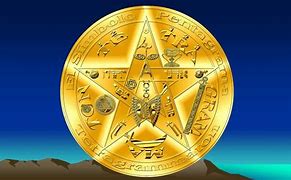










Archaeologists unravel the truth of Aphrodite, goddess of love, on Valentine's Day
Aphrodite is far more than just a simple love deity. This is the conclusion of Professor Bettany Hughes, who visited one of the proposed birthplaces of the deity - the coast of Paphos, Cyprus - in the latest season of her Treasures of the World documentary series. The series, which is airing right now, takes viewers through a stunning assortment of archaeological wonders, from the perfumed sanctuary of Aphrodite to never-before-filmed Neolithic burial circles in the Arabian desert.
As with many a god in classical mythology, Aphrodite - known for her extraordinary beauty - has a colourful origin.
Prof. Hughes explains: "The story goes that Gaia, the great goddess of the Earth, was sick of her eternal love-making with Uranus, the God of the sky.
"So, she persuaded her son, Cronus, to cut off his father's genitalia with a flint sickle.
"The bloody castrate was thrown into the sea and from this gory, spumy mass arose an awful and lovely maiden - Aphrodite."
In fact, the ancient poet Hesiod proposed that her name was based on the Greek aphrós (φρς), which translates to "sea-foam", although modern scholars believe the etymology may actually be derived from the Semitic languages.
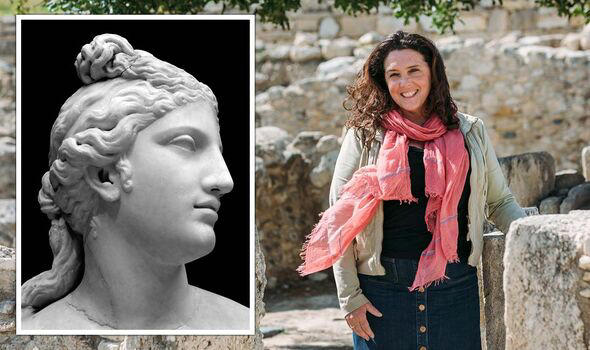
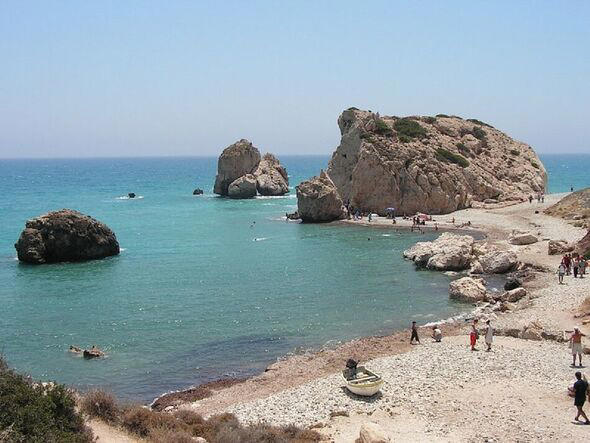
Prof. Hughes continued: "We think of Aphrodite as a sort of sweet goddess of romantic love. But actually, she's the goddess of desire - and desire is a much more powerful, potent feeling.
"It's a feeling that can lead you into all kinds of delicious enjoyment, but all kinds of trouble as well! If you think of Aphrodite as the goddess of desire, it helps to explain her much more kind of ferocious, feisty role as a goddess.
"She's a goddess who can also lead people into war, because they desire someone else's land, someone else's kingdom. So that's why she's this goddess with these incredible sides to her."
This multiplicity is evident in the older goddesses that inspired Aphrodite - with the Phonecians' Astarte, as well as Mesopotamia's Ishtar/Inanna being not only the deities of sexual love, but also of war. Prof. Hughes added: "Aphrodite evolves into the Roman goddess Venus, who led them into war.
"If you look at a lot of the Roman statues of Venus, she's naked, apart from the fact that she's got a helmet on, or a sword strapped around her, or some other kinds of weapons. The great Roman generals like Julius Caesar, Pompey and Sulla would make offerings to Venus. Caesar very famously had this beautiful ring that he wore which had an image of the goddess on.
As part of her documentary, Prof. Hughes also visited some other ancient sites on Cyprus which have ties back to the worship of Aphrodite - starting with the ruins of her sanctuary at Palaepaphos, now a UNESCO World Heritage Site.
In its heyday, the historian explains, a visit to the sanctuary, which was surrounded by "gates of gold", would have been a veritable feast for the senses.
Prof Hughes said: "Ancient authors write about this place in incredibly heady terms, and they talk first of all of Aphrodite coming here, bathing in ambrosial oil until her skin gleams."
The accounts, she continues, describe Arabian incense wafting up from a hundred altars, while the atmosphere was further sweetened by wreaths of flowers - roses in particular.
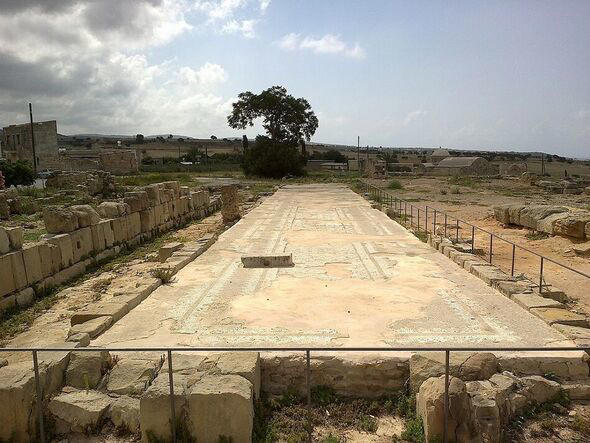
"So, for the Romans, she was very definitely a kind of leader of their troops as well as a leader of love." With Aphrodite seen as the god of nature, birth and death, pilgrims would have flocked to Palaepaphos seeking help in matters of love and life, and leaving behind rich offerings of honey, wine, perfumed oils - and even sculpted figurines.
Prof. Hughes added: "She was also interestingly given these offerings of cakes. So, there are sweet figures from ancient Cyprus of either priestesses or just worshippers carrying trays of specially baked cakes for the goddess. They're very touching, I think."
She joked: "You know, I love a cake - so that's my kind of offering!" Elsewhere on the island, in a series of underground chambers beneath a hill in the the city of Nea Paphos, Prof. Hughes takes her viewers to see a stunning find uncovered from the overgrowth only in the last couple of years by local archaeologists - a niche, for displaying a religious object, that may have been the site of rites in Aphrodite's honour.
The feature - carved into the stone - is thought to have potentially been linked to Aphrodite because it sits beneath what appears to be a giant shell, another symbol associated with the goddess. Above the niche, meanwhile, are a series of bench-like structures on which Prof. Hughes believes Aphrodite's worshippers may have come to dine under the stars in the goddess' honour.
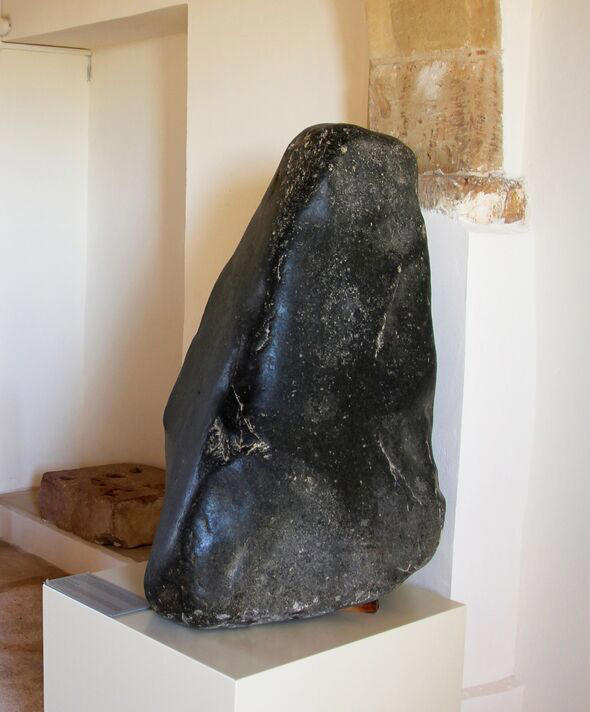
While much is known about Aphrodite, other aspects of her cult and worship remain shrouded in mystery.
Perhaps the most puzzling is how, despite being often depicted as a classical Beauty, her idol at Palaepaphos comes instead in the form of a dark, conical piece of gabbro, an igneous rock that forms deep beneath the Earth's surface.
This rock was painted white, doused in perfumed oil and draped with flowers - and then worshipped. As Prof. Hughes notes: "Even the Romans thought this was a bit weird!"
In fact, the Roman historian Tacitus described the stone thus: "The representation of the goddess is not in human form, but it is a circular mass that is broader at the base and rises like a turning-port to a small circumference at the top."
He concluded: "The reason for this is obscure."
Prof Hughes added: "Not just a romantic love deity, Aphrodite was clearly a complex, potent creature and this island holds many of her secrets.
"The worship of Aphrodite in Cyprus is a treasure for me because it short circuits us into the lives, loves and ambitions of women and men who lived thousands of years before us and the symbols that they left behind."
Finally, Prof. Hughes concludes, one can learn from Aphrodite today.
She explains: "What she reminds us is that we are nothing without the people around us. She steers us through that complicated business of human relationships.
"I think that's what Valentine's day, if you're thinking about love, should be about - how we can best manage the difficult and often messy, challenging business of relationships.
"Aphrodite absolutely reminds us that we're nothing without love."
The Cyprus episode of "Bettany Hughes' Treasures of the World" will air on Channel 4 on February 25. The full series is available to watch now on channel4.com.
Reference: Daily Express: Story by Ian Randall •
Articles - Latest
- Earthquakes can trigger quartz into forming giant gold nuggets, study finds
- Linda Nolan, singer and television personality, dies aged 65
- Sly Stone, pioneering funk and soul musician, dies aged 82
- Dangers of an overloaded car include:
- Natural Disaster today
- Japan earthquake: Kushiro shakes for 'too long' as 6.1 mag tremor hits
- 'Cult' members jailed over coroner kidnap plot
- Flood risk threatens Swiss valley after glacier destroys village
- Thailand Grapples with Floods and Economic Shifts: Government Response, Community Resilience, and Market Predictions
- Powerful hailstorm floods buildings and streets in Gniezno
- The Significance of the 49-Day Journey After Death
- Killing prisoners for transplants: Forced organ harvesting in China
- Southern Japan hit by 6.6-magnitude quake near Nankai Trough, tsunami warnings lifted
- Peru’s coastline battered by tsunami-like waves one day after country declares environmental emergency
- California fires live updates: ‘Dangerous’ winds return as residents are warned over threat of new wildfires
- Osibisa founding member and singer Teddy Osei dead at 88
- Oliviero Toscani, photographer behind shock Benetton ads, dead at 82
- California LA Mayor Karen Bass awkwardly ignores questions from reporter about California fires
- UK set for more freezing weather as homes and businesses deal with flooding
- Jean-Marie Le Pen dead at 96: His political career through the years
- Jimmy Carter, former US president, dies aged 100
- ‘Jazz’s most significant composer’ Benny Golson dies at 95
- Billionaire founder of fashion chain Mango dies in accident
Articles - Most Read
- Main
- Contact Us
- The science behind Ouija boards
- Cosmic Consciousness - What is Cosmic Consciousness-2
- Cosmic Consciousness - Introduction-2
- Cosmic Consciousness-Introduction
- MASSIVE 6.1 MAGNITUDE EARTHQUAKE HITS NEW ZEALAND AS NATION STILL REELING FROM CYCLONE
- ARCHAEOLOGISTS UNRAVEL THE TRUTH OF APHRODITE, GODDESS OF LOVE, ON VALENTINE'S DAY
- Cosmic Consciousness First Words - 1V - 2
- The Human Condition-Thomas Keating
- Cosmic Consciousness First Words - V -
- Cosmic Consciousness V - 2
- Shakyamuni Buddha or India the 1st “Black Revolutionary Hero.”
- Cosmic consciousness - First Words - IV
- Cosmic Consciousness - What is Cosmic Consciousness?
- The Human Condition-2-Thomas Keating
- Evolution and Devolution-Chapter 2
- The Human Condition - Thomas keating-3
- Drinking From The Mountain Stream - Milarepa
- Cosmic Consciousness-On the Plane of Self Consciousness
- The Human Condition - 4
- Cosmic Consciousness - 3 - On the Plane of Self Consciousness
- The Human Condition - 6
- Evolution and Devolution-Chapter 1
- The Buddhist System of Liberation - 2
- Contemplation and the Divine Therapy - 2
- Milarepa's World-2
- On the Plane of Self Consciousness - 2
- The Human Condition - 5
- On the Plane of Self Consciousness IV
- Milarepa's World
- On the Plane of Self Consciousness IV - 2
- The Buddhist System of Liberation
- JERRY RAWLINGS, GHANAIAN STRONG MAN WHO CAME TO POWER IN A COUP BUT INTRODUCED DEMOCRACY – OBITUARY

